J. Edgar Blu-ray Movie
HomeJ. Edgar Blu-ray Movie 
Blu-ray + DVD + UV Digital CopyWarner Bros. | 2011 | 137 min | Rated R | Feb 21, 2012
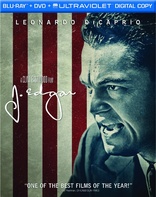
Movie rating
6.5 | / 10 |
Blu-ray rating
| Users | 3.8 | |
| Reviewer | 3.0 | |
| Overall | 3.4 |
Overview
J. Edgar (2011)
J. Edgar Hoover, powerful head of the F.B.I. for nearly fifty years, looks back on his professional and personal life.
Starring: Leonardo DiCaprio, Naomi Watts, Judi Dench, Armie Hammer, Josh LucasDirector: Clint Eastwood
| Drama | Uncertain |
| History | Uncertain |
| Biography | Uncertain |
Specifications
Video
Video codec: MPEG-4 AVC
Video resolution: 1080p
Aspect ratio: 2.40:1
Original aspect ratio: 2.39:1
Audio
English: DTS-HD Master Audio 5.1 (48kHz, 24-bit)
French: Dolby Digital 5.1 (640 kbps)
Subtitles
English SDH, French, Spanish
Discs
50GB Blu-ray Disc
Two-disc set (1 BD, 1 DVD)
UV digital copy
DVD copy
Packaging
Slipcover in original pressing
Playback
Region free
Review
Rating summary
| Movie | 2.5 | |
| Video | 4.0 | |
| Audio | 4.5 | |
| Extras | 1.5 | |
| Overall | 3.0 |
J. Edgar Blu-ray Movie Review
A fatally flawed man, a fatally flawed biopic...
Reviewed by Kenneth Brown February 20, 2012No need to belabor the point. J. Edgar is a mess, from start to finish. And, for once, the reason strikes me as blindingly clear, although you'll have to bear with me as I present the evidence. To begin, let's pay a visit to the only extra that accompanies J. Edgar: "The Most Powerful Man in the World," an 18-minute production featurette in which the cast and crew discuss the very building blocks of the film itself. It's a fairly fascinating overview of J. Edgar Hoover's life, with Leonardo DiCaprio, Naomi Watts, Armie Hammer, Denis O'Hare, screenwriter Dustin Lance Black, producer Brian Grazer, executive producer Erica Huggins, producer Robert Lorenz and others dissecting the man and his legacy, his confidants, his accomplishments and mistakes, his career and personal relationships, and, above all, his most tightly guarded secrets. Every actor, writer and producer speaks eloquently and passionately about the history and Black's take on it. They all admit how little anyone actually knows about Hoover, sure, but each one of them still has a firm grip on who they believe he was, how the culture and politics of the era shaped his policies and philosophies, and what made him tick. But, in the midst of it all, as they turn their attention to Hoover's relationship with his closest confidant and suspected lover, Clyde Tolson, Lorenz makes a brief but very telling observation: "Lance was on one side of the, uh, issue, although he wrote a very balanced script. And, I think, uh, probably Clint was on the other side, but he was interested in exploring all the different possibilities." Sides? Black and Eastwood were on two separate sides of "the issue?" No wonder the end result lacks cohesion.

Hoover avoids the light at all costs yet hungers for the spotlight.
Let's go back to "The Most Powerful Man in the World" for a moment. Eastwood speaks for a grand total of 75 seconds (yes, I timed his appearances) over the course of the 18-minute featurette. On Hoover's secret files: "The rumor was, of course, that he had so much on people that they couldn't fire him. And that might have been true. I don't know." On his reorganization of the Library of Congress: "The catalogs are all there. They moved it into another area now because it's obsolete by today's standards. But it's all there. And you go through those cards, and they're the same cards that Gandy, Tolson and Hoover and everybody used and looked at." On his trusted secretary, Helen Gandy: "Anybody who questioned her, including congressional hearings, got not much of an answer." On Hoover and Tolsen: 'They were, uh, inseparable pals. They just kind of hung out. Some people were insinuating that there might have been more to the relationship than just buddies. Nobody really knows for sure." On their friendship: "People kind of assumed they were a couple. They might've been. They might not have. That will be up to the audience to kind of have to decipher through all that." On Hoover's shadier connections: "He might have had some friends that controlled all the gambling. And he liked gambling, so who knows?" On his possible ties to the mob: "I don't know whether he was pressured to do so or not. He eventually took down a lot of the mob." On the women he courted: "What their relationships were, I don't know. That's all part of the mystery of him." On the essence of the man: "I mean, he's part good guy, part bad guy, intruding on people's lives. You know, whether he did the right choices or made the right selection all the time... remains to be seen."
Did you catch it? Detect something odd? Something out of sorts? When you watch "The Most Powerful Man in the World," you'll see it. When you watch J. Edgar you'll certainly feel it. Eastwood is amused by the lack of hard facts on Hoover and no doubt intrigued by the history, but he never exhibits any real interest in who the man was; not just on the surface, but beneath all of his many, many secrets. Eastwood offers little insight into anything, really, least of all his approach to the film, tossing out I don't knows and who knows as if a prevailing theory never came to fruition. You don't have to read very many interviews with Eastwood either to detect the same cranky borderline disinterest. Hoover's implementation and development of the FBI and forensic science piques the director's sensibilities, that much is sure, but other aspects of Black's script? Not so much, making for an extremely disjointed film that begins to come apart after an admittedly solid first act. Eastwood's grip on the wheel goes slack every time Hoover clocks out and goes home, making for second and third acts that bobble -- back and forth, back and forth -- between two distinct movies; one carefully constructed and absorbing, the other mismanaged and heavy-handed. He also doesn't quite know how to handle the complex affection expressed between Hoover (DiCaprio) and Tolson (Hammer), at least not in a subtle, emotionally honest fashion; he pushes his leads to overact whenever romantic feelings are stirred and adds out-of-place guitar cues instead of relying on the power of his actors' performances; and he doesn't ever really explore what made Hoover think, act and move as he did (a domineering mother and a cute guy at the office is all we're given). Worse, Eastwood takes bizarre leaps and makes confounding connections between events and periods in history. Hoover's disdain for Martin Luther King Jr. is intercut with the death of his mother and a bit of cross-dressing, news of the assassination of JFK reaches him while he's listening to an oh-so-audible recording of a politician having sex, and a horse race leads to Tolson upping his flirtations then exploding like a melodramatic madman when Hoover mentions a woman... just to name a scant few.
My apologies if it sounds like I'm taking cheap shots at Eastwood, arguably one of Hollywood's finest, if not most divisive, directors. It's actually disappointment that's driving me. I had high hopes for an Eastwood-helmed period biopic, and even higher hopes that the filmmaker who gave us Unforgiven and Letters from Iwo Jima might shed some light on Hoover's life and character (or lack thereof). But so much of the film is complete fabrication that it's hard to take it at face value, especially when outbursts, life-altering choices, ugly prejudices and other startling shocks to the system appear out of a vacuum, sometimes with little rhyme or reason. I can't tell you how many scenes left me laughing in disbelief, and not because they were meant to. Try not to chuckle when Tolson lays out his conditions for agreeing to be the assistant director of the bureau. Or when Hammer, in a jealous fit, throws a glass that shatters into a hundred little pieces. DiCaprio, without missing a beat, screams "pick up that glass!" On his first and only date with his future secretary (Watts), Hoover proposes, citing his excellent judge of character. It isn't a scene that speaks to Hoover's insecurities so much as it does Eastwood, or perhaps Black's, reliance on improbable and seemingly random dot-connecting. All the while, Tolson shows he has a fondness for fashion, design, fancy dinners, primping and preening, which begs the question: just how many gay stereotypes is Eastwood shooting for? Was the real Tolson this flamboyant? (In which case all is as it should be.) Or is Eastwood simply worried audiences won't clue into Tolson's sexuality if Hoover's right hand man doesn't adhere to a nearly out of the closet checklist? (There were times I was convinced it was my short-sighted grandfather that was directing J. Edgar, and no, that isn't a good thing.) Later, Hoover's mother, in what should be an unsettlingly cold exchange, expresses her distaste for homosexuals. Instead of cranking up the heat, though, she tells a dicey story about a boy who killed himself and closes with a silly, drama-deflating line: "I'd rather have a dead son than a daffodil." Soon thereafter, the subject of cross-dressing is breached when Hoover, distraught over the death of his mother, begins putting on her necklace and one of her dresses, only to collapse beside her bed; an out-of-nowhere act of desperation that not only undermines her death and its impact, but undermines Hoover's struggles with his sexuality, his quest for identity, and his inconsolable grief. Sigh. It's as if Eastwood starts swinging wildly the moment Hoover's homosexuality rears its head, making the director appear woefully out of touch and out of sorts.
Still, buried somewhere within J. Edgar is a film worth watching. Specifically, a film about the genesis of the FBI and the enigmatic power player who developed the bureau, nurtured it, and honed its practices and methodology for fifty long years. His distrust of social radicals leads to a string of Department of Labor deportations, his fierce attack earns the attention of the Justice Department (where he becomes the director of the Bureau of Investigation), his work surrounding the Lindbergh kidnapping forever changes the way crime scenes and criminal investigations are handled (the bulk of which amount to the most engrossing sequences in the film), his pull in Hollywood changes the public's perception of mobsters and G-Men, and, eventually, his wire-tapping and secret-file-keeping allow him to wield incredible power, bending politicians, and even presidents, to his will. And it's here, in Hoover's early and late career, that both DiCaprio and Eastwood excel. This is the story Eastwood is interested in exploring; this is the story he uses to bring out the best in his actors; this is the story that showcases the authority the director brings to his best projects. It's just a shame he couldn't do the same in the scenes centered on Hoover's personal life. I have very little patience for unbalanced, half-hearted biopics and J. Edgar is exactly that. You can feel Eastwood come to life when Hoover is on the case, or testifying in front of Congress, or attempting to make his country a better place (come Hell or high water), or preparing to blackmail a Kennedy, or delivering an impassioned speech, or trying to win the respect of the American people with any and every trick in the book. Watching DiCaprio rise on the winds of good intentions and fall as absolute power corrupts absolutely is mesmerizing; just as mesmerizing as watching such a powerful figure struggle with his sexuality could be, particularly in an era when "coming out" or "living out" wasn't an option. Eastwood has a firm grasp on the former, but bumbles and fumbles the latter. Here's hoping he sticks to screenplays he's passionate about rather than screenplays that cause him to choose a side opposite a screenwriter. Black's J. Edgar would have been much better served had it landed on another director's desk.
J. Edgar Blu-ray Movie, Video Quality 
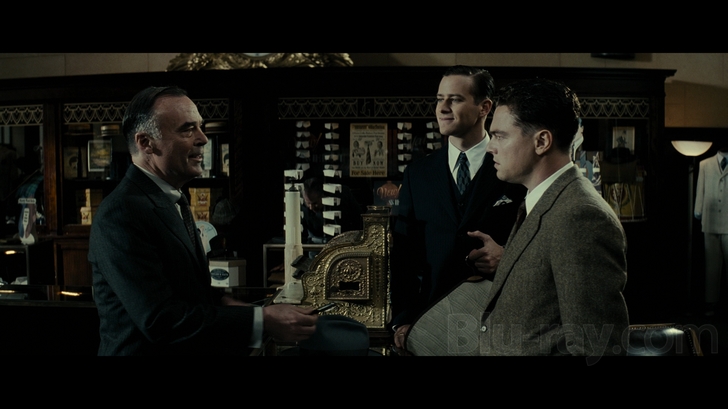
J. Edgar's 1080p/AVC-encoded video presentation is a stark, almost monochromatic affair, but, by and large, it's true to Eastwood and cinematographer Tom Stern's intentions. Colors are often quashed in the process, primaries are nearly bleached out of existence and black levels have been cranked up to eleven. The image, though, is crisp and consistent, and encode-born crush isn't an issue. Detail is quite refined, with cleanly resolved fine textures, well-defined edges, and revealing closeups. It proves too revealing on occasion -- DiCaprio's makeup and prosthetics make for a convincing Old Man Hoover; Hammer's rubbery full-face mask, meanwhile, makes the poor actor look as if he stepped out of the climax of Drive -- but by no fault of the encode itself. If anything, many a detail is lost forever in the shadows. Most, if not all of this loss is attributable to Eastwood and Stern's color grade, but I couldn't shake the nagging feeling that a bit more detail was apparent in the film's theatrical presentation, leaving me to wonder if J. Edgar is yet another new Warner release in which contrast has been boosted after the fact. Fortunately, significant artifacting, banding, aliasing, ringing, smearing and other crimes of the Blu-ray state are nowhere to be found, and the encode is as striking as it is proficient.
J. Edgar Blu-ray Movie, Audio Quality 
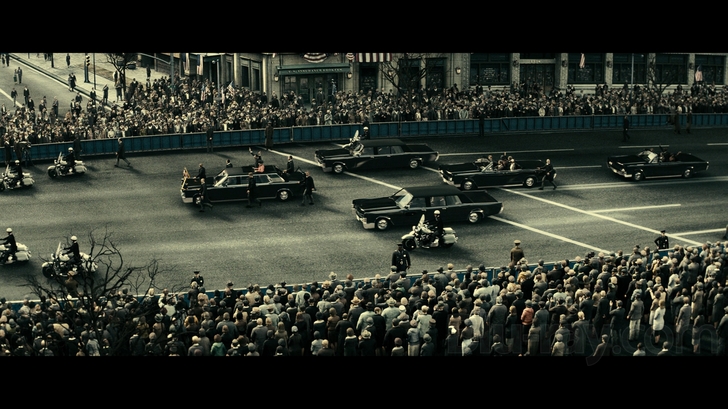
J. Edgar's DTS-HD Master Audio 5.1 surround track is as cautious, calculating and secretive as you'd expect a lossless mix accompanying a biopic of Hoover's life to be, and nothing escapes its pursuit. Dialogue is clear, intelligible and naturally grounded in the soundscape, and Hoover's speeches to his recruits, testimonies before Congress, and inner-office outbursts and tirades are particularly punchy and powerful. LFE output, though rightfully reserved on many an occasion, is bold and brutal, and rear speaker activity, also restrained whenever necessary, is immersive and convincing. Early in the film, a bomb explodes just outside of a house, shaking the floor as the windows of a house shatter and send glass scattering across the soundfield. Later, Hoover's assault on the mob features a flurry of aggressive activity, all showcased wonderfully with precise directionality, smooth cross-channel movement, and notable dynamics. Eastwood's original music is given plenty of time to shine as well, even though it often favors light, lonely melodies above anything more assertive. All in all, J. Edgar sounds every bit as good as it should. Warner's lossless track won't exactly wake the neighbors, but it won't leave audiophiles wanting either.
J. Edgar Blu-ray Movie, Special Features and Extras 
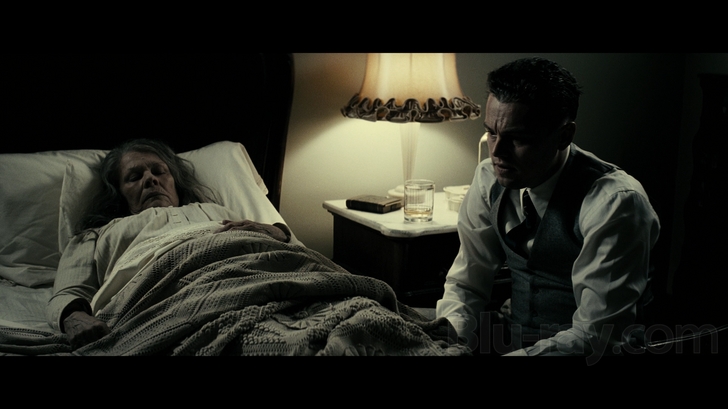
The only extra included is "The Most Powerful Man in the World" (HD, 18 minutes), a detailed overview of Hoover's life and career (at least what we know of either one), his two confidants and chief contributions, and his place and notoriety in history. Director Clint Eastwood joins Leonardo DiCaprio, Naomi Watts, Armie Hammer, Denis O'Hare, screenwriter Dustin Lance Black, producer Brian Grazer, executive producer Erica Huggins, producer Robert Lorenz and others to share his thoughts on Hoover, Black's script and more. Unfortunately, as I outlined before, Eastwood offers very little insight whatsoever, tasking DiCaprio, Black, Watts, Huggins and Lorenz with shouldering the bulk of the featurette's burden.
J. Edgar Blu-ray Movie, Overall Score and Recommendation 
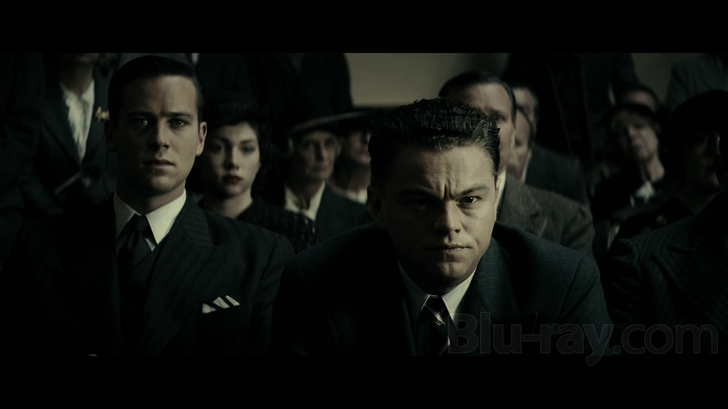
I came away from J. Edgar with a sense of befuddlement. I wasn't any closer to understanding Hoover the man than I was when I walked in. Eastwood struggles when plumbing the depths of Hoover's personal life, and the film only clicks into place when examining Hoover's sometimes illustrious, sometimes notorious career. Even then, it's his early career, the evolution of the FBI and DiCaprio's performance that work. Hoover's twilight years are more of a mystery than ever, though, and the film offers broad speculation in place of real insight; speculation that's rendered more and more problematic as Eastwood bucks against Black's script. Thankfully, Warner's AV presentation isn't a disappointment. J. Edgar may only include a single extra, but its video transfer is fit and faithful, its DTS-HD Master Audio track is excellent, and very little seems out of sorts. If only I could say the same for the biopic itself...
Similar titles
Similar titles you might also like

Cesar Chavez
2014

The Iron Lady
2011

Invictus
2009

The Irishman
2019

Lee Daniels' The Butler
2013

John Adams
2008

Nixon
Election Year Edition
1995

Milk
2008

The Last King of Scotland
2006

The Aviator
2004

Che: Part One
2008

Darkest Hour 4K
2017

Jimmy's Hall
2014

Frost/Nixon
2008

Lincoln
2012

All the President's Men
Two-Disc Special Edition | featuring All the President's Men Revisited
1976

A Man for All Seasons
1966

Jackie
2016

12 Years a Slave
2013

Nicholas and Alexandra
Limited Edition to 3000 - SOLD OUT
1971

